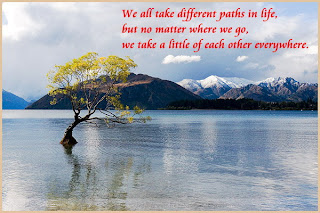"In the ages to come man may be able to predict, perhaps even to control, the wayward courses of the winds and clouds, but hardly will his puny hands have strength to speed afresh our slackening planet in its orbit or rekindle the dying fire of the sun."
We must know our ends and experience our ends to understand where we come from and what we think. Understanding or gaining insight on why we think the way we think gives true insight into where those thought have come from and how they came to be. This is a process of going back and forth and back again. As life moves in its circular nature, so do our thoughts, actions, and feelings. It is a constant may-go-round, but knowledge is discovered as the cycle continues. I have truly enjoyed this class and have the opportunity to have Dr. Sexson as a teacher. He is a true gem of a person and I will always remember his depth of knowledge and the relate able person he is. As I think back over the semester and all the class discussions, I find myself remembering and somewhat reliving several moments in my mind. This to me is the process of Myth....Beginnings, middles, and ends and then back again.
Achilles was the son of the mortal Peleus and the Nereid Thetis. He was the mightiest of the Greeks who fought in the Trojan War, and was the hero of Homer's Iliad. Thetis attempted unsuccessfully to make her son immortal. There are two versions of the story. In the earlier version, Thetis anointed the infant with ambrosia and then placed him upon a fire to burn away his mortal portions; she was interrupted by Peleus, whereupon she abandoned both father and son in a rage. Peleus placed the child in the care of the Centaur Chiron, who raised and educated the boy. In the later version, she held the young Achilles by the heel and dipped him in the river Styx; everything the sacred waters touched became invulnerable, but the heel remained dry and therefore unprotected.
When Achilles was a boy, the seer Calchas prophesied that the city of Troy could not be taken without his help. Thetis knew that, if her son went to Troy, he would die an early death, so she sent him to the court of Lycomedes, in Scyros; there he was hidden, disguised as a young girl. During his stay he had an affair with Lycomedes' daughter, Deidameia, and she had a son, Pyrrhus (or Neoptolemus), by him. Achilles' disguise was finally penetrated by Odysseus, who placed arms and armor amidst a display of women's finery and seized upon Achilles when he was the only "maiden" to be fascinated by the swords and shields. Achilles then went willingly with Odysseus to Troy, leading a host of his father's Myrmidons and accompanied by his tutor Phoenix and his close friend Patroclus. At Troy, Achilles distinguished himself as an undefeatable warrior. Among his other exploits, he captured twenty-three towns in Trojan territory, including the town of Lyrnessos, where he took the woman Briseis as a war-prize. Later on Agamemnon, the leader of the Greeks, was forced by an oracle of Apollo to give up his own war-prize, the woman Chryseis, and took Briseis away from Achilles as compensation for his loss. This action sparked the central plot of the Iliad, for Achilles became enraged and refused to fight for the Greeks any further. The war went badly, and the Greeks offered handsome reparations to their greatest warrior; Achilles still refused to fight in person, but he agreed to allow his friend Patroclus to fight in his place, wearing his armor. The next day Patroclus was killed and stripped of the armor by the Trojan hero Hector, who mistook him for Achilles.
Achilles was overwhelmed with grief for his friend and rage at Hector. His mother obtained magnificent new armor for him from Hephaestus, and he returned to the fighting and killed Hector. He desecrated the body, dragging it behind his chariot before the walls of Troy, and refused to allow it to receive funeral rites. When Priam, the king of Troy and Hector's father, came secretly into the Greek camp to plead for the body, Achilles finally relented; in one of the most moving scenes of the Iliad, he received Priam graciously and allowed him to take the body away.
After the death of Hector, Achilles' days were numbered. He continued fighting heroically, killing many of the Trojans and their allies, including Memnon and the Amazon warrior Penthesilia. Finally Priam's son Paris (or Alexander), aided by Apollo, wounded Achilles in the heel with an arrow; Achilles died of the wound. After his death, it was decided to award Achilles' divinely-wrought armor to the bravest of the Greeks. Odysseus and Ajax competed for the prize, with each man making a speech explaining why he deserved the honor; Odysseus won, and Ajax then went mad and committed suicide.
During his lifetime, Achilles is also said to have had a number of romantic episodes. He reportedly fell in love with Penthesilia, the Amazon maiden whom he killed in battle, and it is claimed that he married Medea.




















